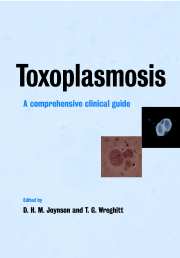Book contents
- Frontmatter
- Contents
- List of contributors
- Preface
- Historical perspective
- 1 Biology of toxoplasmosis
- 2 Immunology of toxoplasma infection
- 3 The epidemiology of toxoplasma infection
- 4 Infection in the immunocompetent
- 5 Toxoplasma infection in HIV-infected patients
- 6 Toxoplasma infection in immunosuppressed (HIV-negative) patients
- 7 Maternal and foetal infection
- 8 Prenatal screening for toxoplasma infection
- 9 Newborn screening for congenital toxoplasma infection
- 10 Infections in neonates and infants
- 11 Ocular infection
- 12 Laboratory diagnosis of toxoplasma infection
- 13 Antitoxoplasma chemotherapy
- 14 Toxoplasma vaccines
- Appendices: protocols for treatment and management
- 1 Suggested treatment protocols
- 2 Management of toxoplasma infection in pregnancy
- 3 Hygiene measures to prevent infection
- 4 Classification system and case definitions of Toxoplasma gondii infection in immunocompetent pregnant women and their congenitally infected offspring
- Index
12 - Laboratory diagnosis of toxoplasma infection
Published online by Cambridge University Press: 24 September 2009
- Frontmatter
- Contents
- List of contributors
- Preface
- Historical perspective
- 1 Biology of toxoplasmosis
- 2 Immunology of toxoplasma infection
- 3 The epidemiology of toxoplasma infection
- 4 Infection in the immunocompetent
- 5 Toxoplasma infection in HIV-infected patients
- 6 Toxoplasma infection in immunosuppressed (HIV-negative) patients
- 7 Maternal and foetal infection
- 8 Prenatal screening for toxoplasma infection
- 9 Newborn screening for congenital toxoplasma infection
- 10 Infections in neonates and infants
- 11 Ocular infection
- 12 Laboratory diagnosis of toxoplasma infection
- 13 Antitoxoplasma chemotherapy
- 14 Toxoplasma vaccines
- Appendices: protocols for treatment and management
- 1 Suggested treatment protocols
- 2 Management of toxoplasma infection in pregnancy
- 3 Hygiene measures to prevent infection
- 4 Classification system and case definitions of Toxoplasma gondii infection in immunocompetent pregnant women and their congenitally infected offspring
- Index
Summary
The laboratory diagnosis of infection with Toxoplasma gondii often plays a key role in determining optimal clinical management. In the immunocompetent, where toxoplasmosis usually poses no significant clinical threat, confirmation of acute infection can exclude other potentially more serious aetiologies. In other clinical scenarios where toxoplasma infection can result in severe sequelae, interpretation of laboratory findings poses significant challenges. A major complication is that the parasite can present in an acute, chronic, latent or reactivated form, and discrimination of these is often crucial in understanding clinical relevance. Further, an accurate diagnosis may be made substantially more difficult if certain organs are involved (eye, brain) or by the presence of an underlying disease (HIV infection) or medical procedures (cardiac transplant). Ironically, perhaps, it is in such clinical groups that the most severe sequelae of toxoplasma infection occur.
As with many other diseases, the diagnosis of T. gondii infection rests upon conclusions drawn from clinical, radiological and laboratory investigations. However, due to the often nonspecific symptoms and signs, or frequently asymptomatic nature of this infection, diagnosis in most cases relies primarily upon laboratory testing. In addition to confirming infection, such tests can aid in determining prognosis, influence management, and assist in monitoring response to treatment. Further, from an epidemiological perspective, laboratory testing (serological and parasitological) is an integral component of case definitions and classification systems that have been constructed for T. gondii infections in immunocompetent women and their congenitally infected offspring (Lebech et al. 1996) (see Appendices).
- Type
- Chapter
- Information
- ToxoplasmosisA Comprehensive Clinical Guide, pp. 296 - 318Publisher: Cambridge University PressPrint publication year: 2001
- 7
- Cited by



